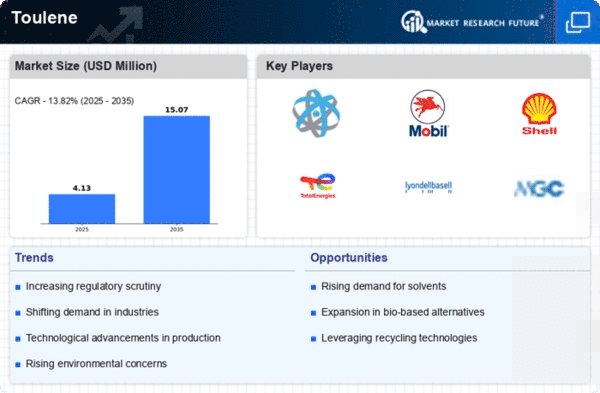Top Industry Leaders in the Toulene Market

The global toluene market fueled by its diverse applications across industries like chemicals, pharmaceuticals, paints, and automotive. But within this thriving market lies a dynamic competitive landscape, where established players and new entrants vie for market share. Let's delve into the strategies they employ, the factors shaping market leadership, and the latest developments influencing the toluene landscape.
Strategies employed by key players:
- Vertical integration: Integrating operations across the toluene value chain, from feedstock procurement to downstream production of derivatives, optimizes costs and ensures supply chain stability. Exxon Mobil and INEOS are prime examples of companies leveraging this strategy.
- Product diversification: Offering a diverse range of toluene grades and blends caters to varied customer needs and expands market reach. LyondellBasell Industries is known for its extensive portfolio of toluene products.
- Geographical expansion: Targeting high-growth regions like Asia Pacific, with its booming construction and automotive sectors, provides significant market opportunities. SABIC actively focuses on expanding its reach in this region.
- Research and development: Investing in R&D to develop eco-friendly toluene production processes and explore alternative feedstocks like biomass helps mitigate environmental concerns and opens up new avenues for growth. BASF SE showcases a strong commitment to sustainable toluene production.
- Strategic partnerships and acquisitions: Collaborating with other industry players expands capacities, diversifies expertise, and facilitates access to new markets. Recent examples include Exxon Mobil's joint venture with Saudi Aramco for a toluene production facility in Saudi Arabia.
Factors influencing market share:
- Production capacity and reliability: Consistent and dependable supply of toluene at competitive prices attracts customers and builds trust. Companies with established production facilities and efficient logistics networks hold an advantage.
- Product quality and consistency: Meeting stringent quality standards for purity and grade specifications is crucial for maintaining customer loyalty, especially in industries like pharmaceuticals and food packaging.
- Regulatory compliance: Navigating the evolving regulatory landscape surrounding toluene production and usage is essential for avoiding operational disruptions and potential penalties. Companies with strong compliance systems have a clear edge.
- Customer service and technical support: Offering prompt and professional customer service, along with technical expertise and application support, fosters long-term relationships with customers.
List of Key Players in the Toluene Market:
- Exxon Mobil Corporation (U.S.)
- Covestro AG (Germany)
- BP p.l.c. (U.K)
- China Petroleum & Chemical Corporation (China)
- BASF SE (Germany)
- Royal Dutch Shell plc (the Netherlands)
- Formosa Chemicals & Fibre Corporation (Taiwan),
- Indian Oil Corporation Ltd (India)
- The Dow Chemical Company (U.S)
- TOTAL S.A. (France)
Recent developments:
August 2023: Exxon Mobil announces plans to expand its toluene production capacity in Texas by 20%, citing rising demand from the petrochemical industry.
September 2023: LyondellBasell partners with a leading Chinese chemical company to establish a joint venture for toluene production in China, targeting the rapidly growing domestic market.
October 2023: The European Union proposes stricter regulations on toluene emissions from industrial facilities, prompting concerns about potential supply chain disruptions for European toluene producers.
November 2023: BASF SE unveils a breakthrough technology for producing toluene from biomass, paving the way for a more sustainable future for the industry.
December 2023: A major toluene pipeline leak in the United States disrupts supply to refiners and downstream industries, highlighting the vulnerability of the market to logistical disruptions.










